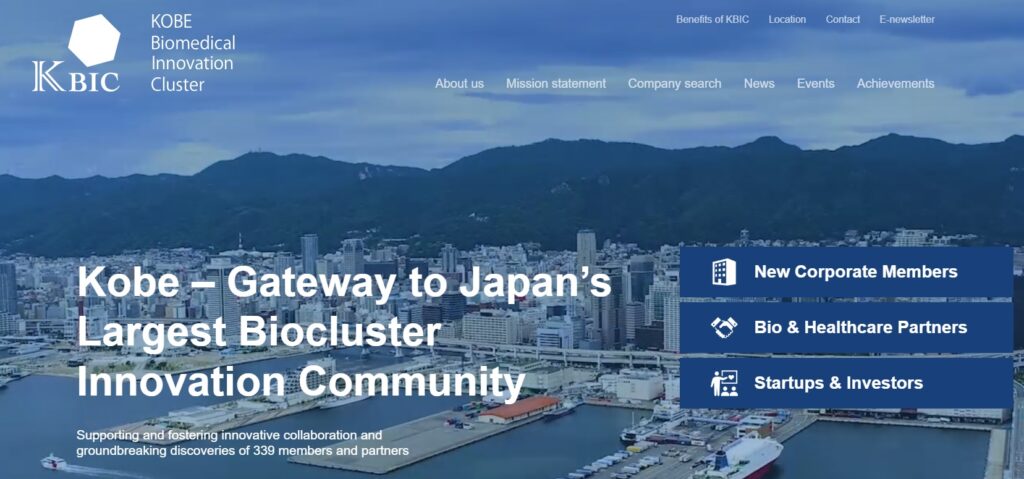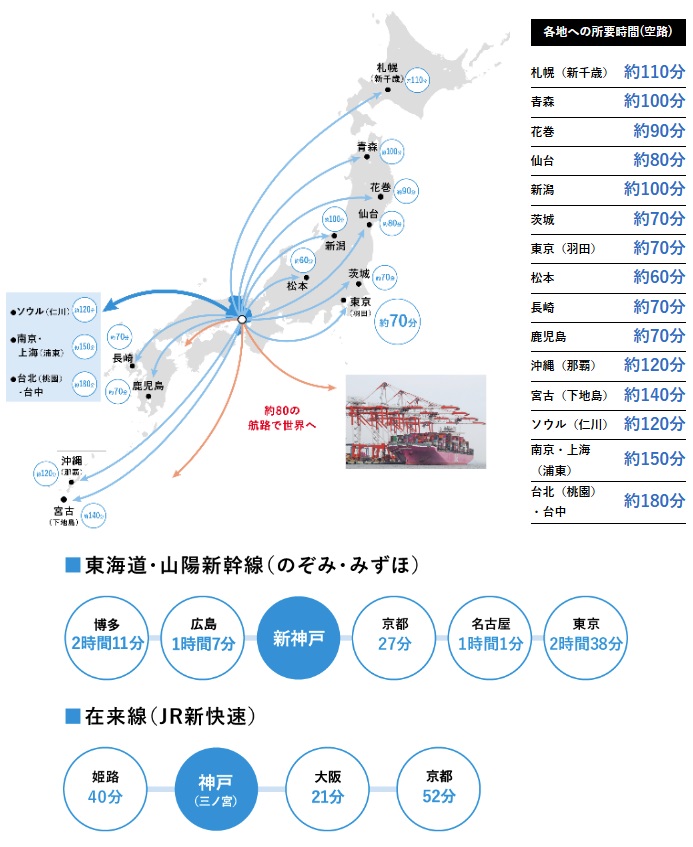Why Kobe Stands Out: A Gateway to Japan’s Biomedical Future and International Growth
When global companies consider expanding into Japan, the spotlight often falls on Tokyo or Osaka. Yet overlooking Kobe would be a mistake. Situated in Hyogo Prefecture within the powerful Kansai economic region, Kobe offers a rare combination of cutting-edge research infrastructure, global accessibility, lifestyle advantages, and government-backed incentives. More than just another entry point into Japan, Kobe has carved out a distinct identity: it is a biomedical innovation hub, a model of disaster resilience, and one of Japan’s most internationally minded cities.
For investors, Kobe represents more than opportunity—it represents long-term security and growth potential in a stable, welcoming environment. This article explores why Kobe should feature prominently in the decision-making of any overseas company evaluating Japanese markets.
A Port City with Global DNA
Kobe’s global identity is deeply rooted in history. In 1868, Kobe was among the first Japanese ports opened to foreign trade. This legacy gave rise to one of Japan’s earliest and most enduring international communities, fostering a business environment shaped by global influence.
Today, Kobe remains one of the country’s four major international ports, handling vast flows of containerized cargo, automobiles, and bulk goods . Its location on the Seto Inland Sea provides direct maritime access across Asia, making it an ideal logistics and distribution hub.
But Kobe’s global DNA goes beyond shipping. The city has built a reputation for openness to international companies, multicultural living, and cross-border collaboration. This sets it apart from more insular business environments elsewhere in Japan, making foreign executives and employees feel at home.
The Kobe Biomedical Innovation Cluster

Perhaps the single most distinctive feature of Kobe’s economy is the Kobe Biomedical Innovation Cluster (KBIC)—the largest life sciences hub in Japan.
Spanning the Port Island district, KBIC hosts over 370 organizations, including universities, pharmaceutical companies, hospitals, and research institutes . Its specializations include:
- Regenerative medicine and cell therapy (home to some of the world’s leading research in iPS cells).
- Pharmaceutical development, from early-stage biotech to major international firms.
- Medical devices and diagnostics, with test labs and commercialization facilities.
The cluster was deliberately created after the 1995 earthquake to drive innovation-led growth. Today, it represents one of the most integrated ecosystems in Asia for medical R&D and commercialization. For foreign companies in healthcare and biotech, KBIC offers plug-and-play laboratory space, opportunities for joint research, and proximity to top academic partners.
Few Japanese cities can rival Kobe in biomedical concentration. For companies seeking to enter Japan’s lucrative healthcare market, Kobe is the natural choice.
A Model “Anti-Disaster” City
Kobe’s identity is also shaped by tragedy—and resilience. The Great Hanshin-Awaji Earthquake of 1995 devastated the city, but its reconstruction has since turned Kobe into a global model for disaster-resilient urban development.
The rebuilt city features:
- State-of-the-art earthquake-resistant infrastructure in transport, utilities, and buildings.
- Crisis management systems that ensure continuity for business operations.
- International disaster research centers, making Kobe a thought leader in urban resilience.
For global investors, this resilience is not just symbolic—it translates directly into reduced business risk. Companies in Kobe can expect operations to be less vulnerable to disruption compared to locations without such preparedness. Kobe’s transformation into an “anti-disaster city” demonstrates both its stability and its forward-looking governance.
Balanced and Diversified Economy
Unlike some Japanese regions heavily reliant on a single sector, Kobe offers a balanced industrial ecosystem.
Key industries include:
- Life sciences and health technology (anchored by KBIC).
- Robotics and AI, building on Hyogo’s manufacturing heritage and expanding into healthcare, logistics, and service applications .
- Environmental technologies, particularly renewable energy and sustainability solutions, where Kobe has made major policy commitments .
- IT and digital services, supported by local universities and incubators.
- Logistics and trade, leveraging Kobe Port and Kansai’s transport networks.
This industrial diversity matters for investors. It reduces systemic risk and creates cross-sector collaboration opportunities—for example, robotics applied in medical settings, or digital technologies supporting environmental solutions. Kobe’s economy is dynamic yet stable, offering a balanced platform for long-term growth.
International Talent and Lifestyle Advantage
One of Kobe’s greatest strengths lies not just in its industries, but in its people.
Talent Availability
- Universities
Kobe University and Kobe Institute of Computing are major sources of skilled graduates in IT, engineering, and business . - Foreign-friendly workforce
Kobe’s large international community ensures access to bilingual staff, which is critical for global operations. - Lower labor costs
Compared with Tokyo, wage expectations are more manageable, helping overseas firms optimize operating costs.
Lifestyle Appeal
Kobe is consistently ranked as one of Japan’s most livable cities. Reasons include:
- International schools
Institutions such as Canadian Academy and Deutsche Schule Kobe make relocation easier for families . - Healthcare
Advanced hospitals and research institutes provide peace of mind for expatriates. - Culture and leisure
Kobe is famous for its jazz scene, gourmet food (including world-renowned Kobe beef), and cosmopolitan atmosphere. - Nature and recreation
Nestled between the Rokko Mountains and the sea, the city offers hiking, skiing, sailing, and hot springs—all within easy reach of the business district.
This high quality of life is not a luxury; it is a strategic advantage in talent retention. Attracting and keeping skilled international staff is one of the biggest challenges for foreign firms in Japan—Kobe makes it easier.
Connectivity and Cost Advantage in Kansai

Kobe’s location in the Kansai region places it at the center of western Japan’s economic gravity.
- Air
Kansai International Airport (KIX) is only 30 minutes from Kobe by train, linking the city to Asia, Europe, and North America. Kobe Airport itself provides fast domestic connections to Tokyo, Sapporo, Okinawa, and other major cities . - Rail
The Shinkansen (bullet train) from Shin-Kobe Station reaches Tokyo in under three hours, and Fukuoka in just over an hour. - Sea
Kobe Port remains a critical logistics hub for exports, especially automobiles and container cargo . - Road
An extensive highway network integrates Kobe into national freight systems.
Crucially, Kobe offers Kansai access at lower costs than Osaka or Kyoto. Office rents are more affordable, congestion is lighter, and daily living expenses are lower—all without sacrificing connectivity. For cost-sensitive international firms, Kobe represents an efficient gateway into western Japan.
Government Incentives for Foreign Companies
Kobe and Hyogo Prefecture actively court overseas investment, offering a wide range of subsidies and incentives. Highlights include:
- Office rent subsidies
Up to 2 million yen annually for three years, covering as much as half of costs. - Market research support
Up to 1 million yen to study business opportunities in Hyogo. - Corporate registration assistance
Up to 200,000 yen to cover legal setup and visa-related expenses. - Priority industry benefits
Enhanced support for companies in renewable energy, aviation, robotics, health & medicine, and semiconductors.
These programs are designed not just for domestic firms, but specifically to ease the entry of foreign-affiliated companies. The message is clear: Kobe wants international businesses and is prepared to help them succeed.
Summary
Kobe is not simply another regional city in Japan; it is a place where global opportunity meets local strength. Its leadership in biomedical research and innovation makes it a magnet for companies in healthcare and life sciences, while its reputation as a disaster-resilient city offers rare assurance of continuity in uncertain times. The city’s diversified economy creates fertile ground for collaboration across sectors, from robotics to green technology, and its openness to international communities makes it a welcoming environment for foreign talent and their families. Add to this the advantages of Kansai’s connectivity, more affordable operating costs compared to larger metropolitan areas, and proactive government support for international businesses, and Kobe emerges as a truly compelling destination. For overseas investors and companies seeking a foothold in Japan, Kobe represents not only a strategic base, but also a sustainable, forward-looking choice for long-term growth.
Feel free to contact us
MAY Planning provides advice on market entry to Kobe. We also offer support on government incentive applications, location and office setups, and relocation in Kobe.
References:
1)Best Portal Zone. (n.d.). HYOGO-Kobe. https://hyogo-kobe.jp/best/en/


